-
SYNONYMS/SYNONYMES (Nadav Lapid 2019)
NADAV LAPID: SYNONYMS/SYNONYMES (2019)
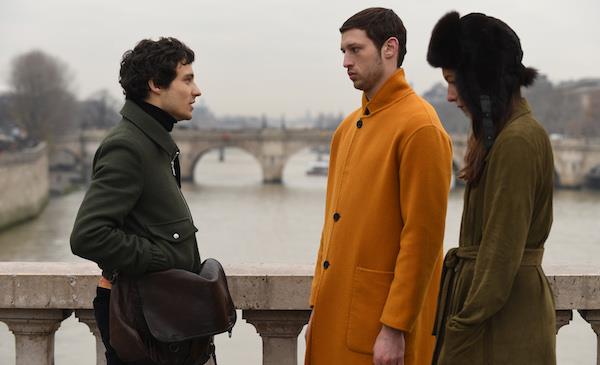
QUENTIN DOLMAIRE, TOM MERCIER, LOUISE CHEVILLOTE IN SYNONYMS
Nationality malaise as a form of madness
Synonyms is a bracing, invigorating film with an explosive young star (found in acting school) and a series of astonishing high-energy, highly-verbal set pieces. They only begin to pall toward the end when things go on a bit too long and as you realize Lapid isn'g going anywhere, that the astonishment hides a certain emptiness. It's surprising to learn the movie's autobiographical because its protagonist is borderline crazy, maybe full-on crazy. But Lapid's treatment of his own experience is free and fanciful and riffs off the distinctive abilities of the lead who's little like him. He has reimagined himself as an idealistic superhero.
Yoav (Tom Mercier, a 26-year-old Israeli* whose actual father is French) arrives in Paris from Israel, enters a large unoccupied apartment and takes a shower. The movie revels in Mercier's well-built, well-hung young body throughout: he has a background as a judo champion and dancer. One of his main assets is his intense physicality and boldness (no apparent hesitation about frontal nudity), which in fact is the picture. Once out of the shower, he discovers that his clothes and his whole big sack of possessions are gone. He runs around frantically from one big empty room to the other naked, freezing. There seems to be no heat. Was there hot water? The movie is vague about details, including how the protagonist speaks French so well.
The movie will return to the fact that Yoav, though he goes out and bangs on other apartment doors, begging in French in vain for help, he never descends to the street and instead returns to the bath tub. Cut to a young (very) French couple who discover him lying there asleep or unconscious. Émile (Quentin Dolmaire of Desplechin's My Golden Days) and Caroline (Louise Chevillotte), partially revive him and carry him out to the big posh nearby apartment they share. The situation that develops may remind you of Bertolucci's The Dreamers, but without the period flavor and graceful ménage à trois interactions of Eva Green, Louis Garrel, and Michael Pitt. In its deliberate unreality, its young seekers, and its eccentric declarations Synonyms suggests Godard films like La Chinoise. The shock-value set pieces also somewhat resemble Ruben Östlund's 2017 The Square.
The opening is shot with vigorous handheld photography whose deliberate brutality conveys a sense of Yoav's dislocation, and is marked by Mercier's sheer exhibitionism. He's a dazzlingly confident , go-for-broke actor whose skill is only undermined by a certain blankness. He's as much a performance artist as a dramatic actor. But is his whole nature perhaps symbolic of Israel itself, bold, brave, intense, but essentially rudderless and heedless? Underlying the whole film there is the implied sweeping, if superficial, critique of Israel. Yoav turns out to have come to France intending to abandon his native country though a decorated soldier. He has no other real plan but to cease being Israeli, stop speaking Hebrew, and become French. He calls Israel "nasty, obscene, ignorant, idiotic, crude and mean-spirited" (méchant, obscène, ignorant, hideux, vieux, sordide, grossier, abominable) and a string of other expressive derogatory adjectives he pronounces with pleasure in the poetic sound of the French words.
"It can't be all those at once," Émile says. "Choose." All this is in French, and Yoav refuses to speak Hebrew throughout except for one humiliating "artist's model" gig and declares his intention to become French. However he gains no other French friends besides Émile and Caroline, though he bonds with a tough, violent Israeli security guard called Yaron (Uria Hayik). He goes to live in a tiny chambre de bonne where he survives on ultra-cheap meals of pasta and canned tomato sauce, whose preparation is dwelt upon almost fetishistically. Eventually Caroline comes there and sleeps with him, overlapping Émile's decision that she should marry Yoav so he can become a French citizen. Godardian, absurdist scenes of a citizenship class follow, along with sequences of semiviolent macho Israeli encounters, some involving the Israeli embassy, and meetups by Skype and in person with Yoav's parents, whom he directs with polite firmness to leave him alone.
The movie presents one scene after another featuring Yoav, in no particular order. Émile, the son of a wealthy industrialist, and his girlfriend Caroline, who plays the oboe in a local arrondissement orchestra, adopt Yoav and want to protect him. One of the movie's most obvious weaknesses is the thinness and wanness of the two French characters. Émile is a would-be writer, who has written 40-odd pages of a novel, but lacks energy and invention. Caroline's main character trait is that she plays the oboe. Yoav begins spouting stories in his odd but curiously fluent French, to augment which he acquires a "good, but light" French dictionary at a bookstore. The film is dominated not only by Mercier's physical presence but by his harsh, confident male Israeli voice, spouting French. He often recites series of words he likes with similar sound, or similar meaning - hence the title. Sexy, graceful, strong, and somehow sensitive, Mercier is always attractive, though with his pointed nose and little mouth he's not handsome.
Instead of mal de pays, longing for homeland, Yoav has the opposite, a kind of nationality malaise. The specific details of why one might be discontented with his native land, its racism, its chauvinism, its militarism, its brutal repression of the Palestinian people, are things Yoav never goes into, though there is a telling scene in French citizenship class where the teacher proudly vaunts the "laïcité," the secularity of France. But this lack of detail reenforces Synonyms' Godadian, Brechtian fable quality. Yoav repeatedly tells Émile how his father told him as a boy the story of Hector and Troy, but refused to reveal to him how it ends. He tells other stories of his life, in an intense, fable-like style, and announces he "gives" these stories to the story-deficient would-be fabulist Émile, who accepts them gratefully.
Yoav becomes increasingly crazy as the oddball distinctiveness of Tom Mercier's personality and thespian skills is slowly but surely ramped up. When asked a profound question about Israel, redemption through nationality vs. inner change at a NYFF Q&A, Lapid answered "Sometimes I just have to say I am only a filmmaker." This movie is notable for its effective theatricality and gritty cinematic qualities - as well as the spot-on editing by the director's mother that's so breathtakingly flashy at times you don't know whether to cheer or jeer. It's not noted for its calm and thoughtful exploration of ideas, or for a meaningful plot line beyond the stunning initial premise.
I enjoyed this film - it's fresh, has an unforgettable opening, and holds your attention much of the way - but in the end I was left wanting more. It may be best discussed by Israelis: its theme is one worth their taking seriously. But it has reminded me that I found Lapid's first two films, both of which I reviewed as part of Lincoln Center film events, were similarly bold and striking yet crude, vague, and lacking structural coherence.
Synonyms/Synonymes, 123 mins., in French with some Hebrew and English, premiered at the Berlinale, winning the Golden Bear top feature prize. Opening a fortnight later in Israeli cinemas, it was slated for nearly two dozen other festivals, including Toronto, New York, and Mill Valley. Watched at a NYFF screening Oct. 1, 2019. It opened in France in March with a fair critical reception (AlloCiné press rating 3.4, but top praise from Cahiers du Cinéma and Les Inrocks). Coming to US theaters Oct. 25, it has a current Metascore of 85%.
_____________
*See more about Mercier in Haaretz.
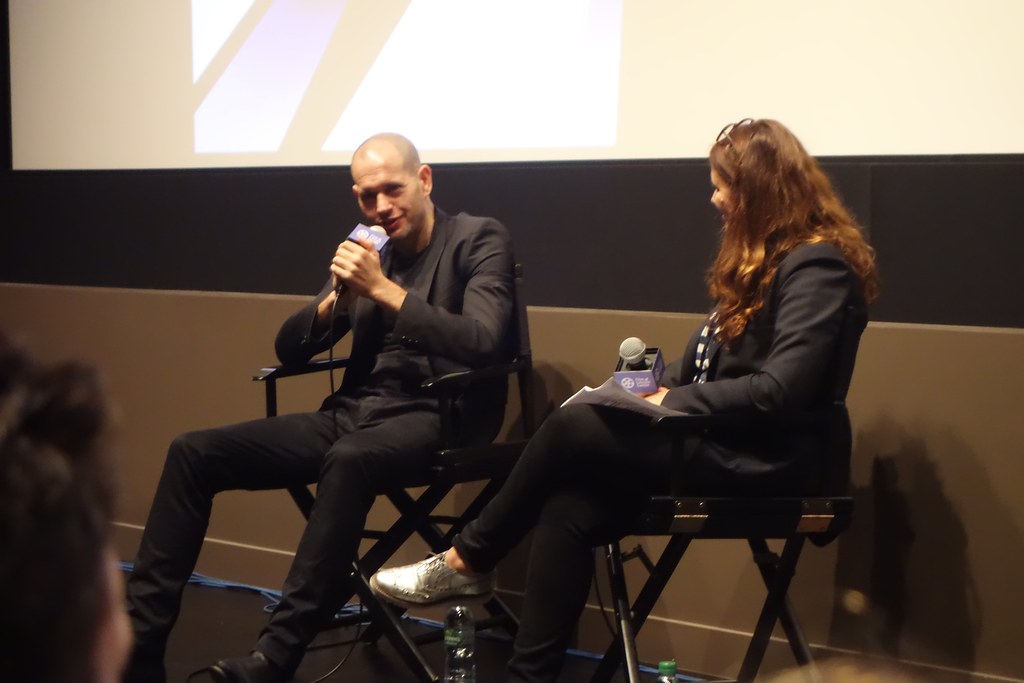
NADAV LAPID AT NYFF Q&A [CK photo]
Last edited by Chris Knipp; 10-21-2019 at 10:45 PM.
-
OH MERCY!/ROUBAIX, UNE LUIÈRE (Arnaud Desplechin 2019)
ARNAUD DESPLECHIN: OH MERCY!/ROUBAIN, UNE LUMIÈRE (2019)
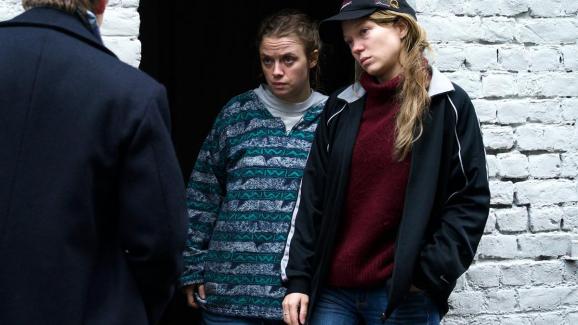
SARA FORESTIER AND LÉA SEYDOUX IN OH MERCY!
A sumptuous but pointless detour for Desplechin
The director departs from bourgeois intellectual families and love affairs to focus on a slow police procedural focused on the death of an old woman, set n his poor, crime-ridden hometown of Roubaix near the Belgian border, and made in declared admiration of Hitchcock's The Wrong Man.
Everything here is beautifully done - yet misguided. The main focus is on the sordid murder of a helpless old woman by a lesbian couple, Marie (Sara Forestier) and Claude (Léa Saydoux), and the captain in charge of the investigation, Commissaire Yacoub Daoud, played by the estimable Roschdy Zem. There is the obligatory rookie detective on the case, Louis Cotterel (Antoine Reinartz). The first hour is spent on other things, a half drunk man caught out in a fake insurance claim, a house fire seen to be arson, cocky young men evading he police, Daoud's angry nephew in prison and his love of horse racing, which Cotterel turns out to be good at betting on.
And still the process of getting Marie and Claude to confess to their murder takes an hour that seems very long. We see the cops work in threes separately on each of the two suspects, a woman and a good cop-bad cop, with Daoud always playing the quiet, restrained good cop. Earlier he has confirmed to Cotterel the rumor that he always knows who is innocent and who is guilty. But such a sixth sense is hardly needed for Marie and Claude because there is so much evidence of murder and of their presence before they[re brought in for questioning. So there is no mystery and nothing interesting to discover. Then when they have separately and together both confessed, with the tougher Claude holding out longer, we have to watch them taken to the crime scene to act it out in more detail. I found this scene, which is gruesome yet trivial, a true banality of evil moment, particularly hard and unrewarding to watch.
This would seem to misunderstand what makes us interested in dramas that depict detailed police investigations. Who cares whether both women had their hands on the poor old lady's neck as she was strangled? This is indeed a detailed introduction to French police methods, but not in a way that holds our interest. It is true that Desplechin departs from the conventional, but only in minuscule ways. Jay Weissberg observed in his Variety review that Daoud is the interesting character, not the women (both actresses rather wasted, especially Seydoux). There's a hint of more to come (as if this were a series pilot) in the news that all Daoud's family have all returned to the "bled", to North Africa, while he's chosen to stay here where he grew up. There could be more about Cotterel, perhaps an emotional trajectory of the relationship between rookie and oldtimer as in Xavier Beauvois' moving The Little Lieutenant .
At the same time the film excels in its rich cast details, nuanced depiction of Roubaix at and just after Christmstime (with a memorably drab shot of street decorations coming down). But somehow this doesn't read as any kind of portrait of Roubaix beyond what we're told at the outset of its former vigor and present poverty and decline.
Desplechin is one of the best and most distinctive contemporary French directors when he's got the right material. The 2015 My Golden Days was great; last time's Ismael's Ghosts was a misfire. This is another of the latter: so much good work, with the wrong material.
Oh Mercy!/Roubaix, une umière,/ 119 mins., debuted in Competition at Cannes, released in France in Aug. 2019, with very good reviews (AlloCiné press rating 3.7); apparently only in four other festivals, including New York and Vancouver. Screened for this review as part of the NYFF, Oct. 2, 2019. Metascore 51%.
Last edited by Chris Knipp; 10-03-2019 at 02:33 PM.
-
FIRST COW (Kelly Reichardt 2019)
KELLY REICHARDT: FIRST COW (2019)
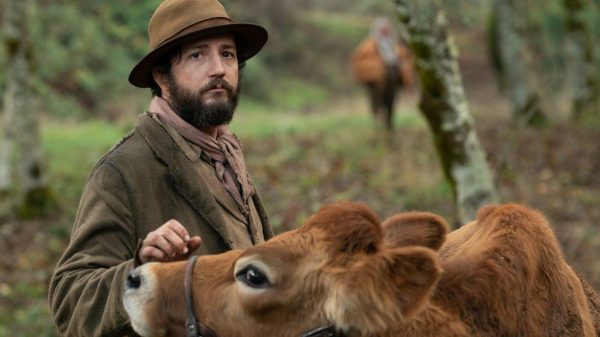
JOHN MEGARO AND THE COW IN FIRST COW
A particularly intense study in Reichardt's taut minimalism
Set in 1820, 25 years before the time of the director's Meeks Cutoff (NYFF 2010), First Cow, about what would become Oregon and beavers and men on the frontier, is a dreamy, cramped, primitive, sad scene of hostile people scrambling... slowly... to survive. Two men cling to each other, the temporary trappers' cook Cookie Figowitz (John Megaro) to King Lu (Orion Lee), a well-traveled Chinese man fluent in English Cookie finds naked fleeing angry Russians.
He helps him and they part, but meet again later, which leads to their sharing a tiny cabin. Together they quietly enter into a business venture to sell tasty buttermilk biscuits laced with honey to the locals in the market. But this tasty, lucrative trade, a hot success in this wild uncivilized place where home cooking is so missed, depends on a supply of milk poached at night from the newly-arrived sole cow in the region, which belongs to the British trapping firm overseer known as the Chief Factor (Toby Jones). This theft is a dangerous game that poses a looming threat over the rest of the tale. The partnership and cohabitation, intensified by the risky venture that makes it feel delicate and doomed, makes us ponder the film's epigraph from William Blake's Marriage of Heaven and Hell: The bird a nest, the spider a web, man friendship. Is it even more, a desperate, lonely love?
The scene is full of vague but intense class strictures: the shyness of Cookie, his secondary status to the macho trappers; the outlier Chinese man he feels safe with, the pompous Chief Factor, the local grandee.
One is continually struck with a sense of things missing, the intentional minimalism of Reichardt's style, the boxy 4:3 aspect ratio, eschewing wide horizons, the many scenes in such low light you can barely make things out. The cakes Cookie bakes, using ingredients King Lu assembles, such a tiny thing to make their fortune, in small batches. This is Slow Food cinema too, a thing not for everyone, but a delight to the devotee.
I kept thinking of Jarmusch's Dead Man, for some reason: it must be set much later, but it evokes raw frontier primitivism too. . . differently, though, with lots of snappy dialogue, humor, and a richer narrative. Yet in the end First Cow wins out in this comparison in certain important categories: sincerity, genuine pathos. I also thought of Young Adult novels. Perhaps too tilted toward the tragic, but this has that quality of showing boys what the frontier life was like, how a man can cook, that it's wrong to steal.
It is in fact difficult to imagine the ideal audience for Kelly Reichardt, which may change from film to film. I respected the subtlety of her debut Old Joy, but seem to have most enjoyed her most conventional film, the 2014 almost-thriller about terrorists, Night Moves. Actually, she can appeal to any fan of uniquely crafted independent films. It's like enjoying being smothered, or at least that's the feeling this time. This is a particularly intense, intimate version of her style, though you know where it is going, and toward the end it moves toward conventional suspense - nicely ending in the air, with an unmistakable but hopefully not too neat visual rhyme with the opening.
First Cow is again freely adapted with the writer Jonathan (or Jon) Raymond, her collaborator for most of her features, this time from the first work of his she read and his debut, The Half-Life. But that book is composed of two stories 150 years apart, and this is just the earlier one, plus a contemporary opening of the finding of two old skeletons shallowly buried side by side, a foreshadowing. Besides, in the book the joint venture is extracting castoreum, a beaver musk highly prized in China. I have not read the book, but I think I would still prefer the simpler version of this film. The minimalism strains the patience at times, but through it Reichardt creates a mood here that haunts and lingers.
First Cow, 121 mins., debuted Aug. 30, 2019 at Telluride, showing also at the New York Film Festival (where Reichardt, Megaro, and Lee were present at Lincoln Center Oct. 3 for a Q&A - watch it HERE - with festival programming director Dennis Lim); it comes to US theaters, distributed by A24, Mar. 6, 2020. Metascore went from 76% at the time of this review to 89% since its US theatrical release.
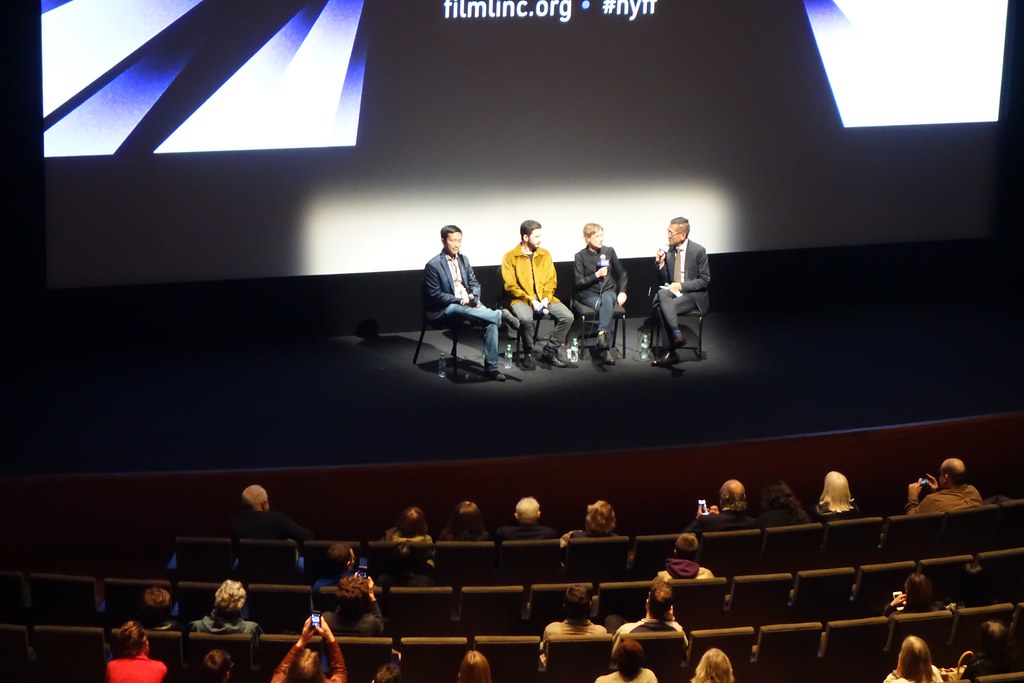
KELLY REICHARDT AND CAST OF FIRST COW INTERVIEWED BY DENNIS LIM AT NYFF Q&A [CK photo]
Last edited by Chris Knipp; 08-15-2020 at 11:43 PM.
-
MARRIAGE STORY (Noah Baumbach 2019)
NOAH BAUMBACH: MARRIAGE STORY (2019)
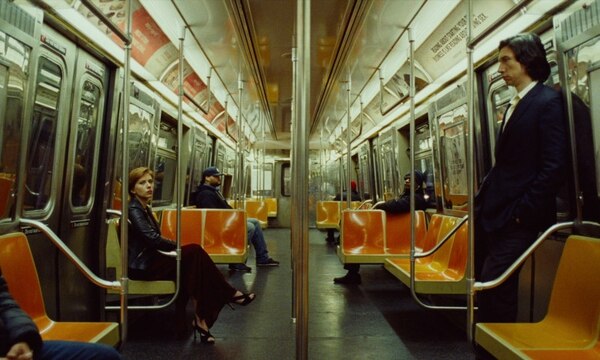
SCARLET JOHANNSON AND ADAM DRIVER IN MARRIAGE STORY
A dramedy for all seasons
This is not just a shift from looking at divorce from the kids' to the parents' point of view, but a dramatic example of how far Baumbach has come as a writer-director since fourteen years ago when his early feature The Squid and the Whale, also about divorce, debuted at the New York Film Festival. He seems so much more fluent, powerful, and at ease here. Squid was witty, snide, subtle, keenly observed. It also seemed a bit snobbish and parochial. It was content with being minor. It was also very "East Coast." Though the battle between the coasts is dramatized here, with the husband, Charlie (Adam Driver) struggling throughout to have his disintegrating nuclear family defined as New York-based, not only is this a battle that he is continually losing, but most of the movie action actually takes place in L.A.
Beyond that, this is a warmly accessible and insanely enjoyable as any American film this year. Quite possibly Baumbach's best work, certainly in some sense the stars', Scarlett Johansson and Adam Driver's best. There is a double aria knockdown verbal yell-fest that's the mother of all marriage squabbles, also a stunning combined tour de force for Driver-Johannson , the director and the crew. The two and a quarter hours go by swiftly. Never before has Baumbach better melded humor and emotion.It's particularly exciting, not to say thrilling, to encounter a film that's at once so accessible and so well-made and specific. Hopefully this time Baumbach can be enjoyed by his widest audience yet, and this can be appreciated by many as one of the best movies of the year. It's the director's tenth feature, and it's a ten out of ten.
The structure is simple and forceful. It's bookended by two statements where Charlie, then Nicole (Johansson), describe what they like and admire about each other - an activity done at the directive of a mediation coach. Charlie is a successful New York theater director, Nicole is an actress. They are breaking up. Things are going to get heated, painful, maybe hostile. This list-making is to ground them in a sense of the good things, the reasons they got together in the first place. The film returns to these lists at the end in a neat and touching way. Throughout, neatness may overwhelm Baumbach's usual subtlety, but there is plenty of wit, and raw emotion trumps sentimentality - the rawness often reflected in the intimacy, sometimes calculated roughness, of the visual style, enhanced by shooting on 35mm.
Any sense of the generic is avoided by the specific focus on the bicoastal issue and the custody and divorce law questions tied to it, while the comedy and the pain are jointly grounded in the work, equally hilarious and cruel, of the divorce lawyers Nicole and Charlie eventually engage. When they're splitting (but still friendly) Nicole goes to Los Angeles to star in a TV series and takes their eight-year-old son Henry (Azhy Robertson) with her.
The balance of sympathy seems to lean toward the male side here. Nicole's TV series remains sketchy. Charlie's theater group comes more to life, with Wallace Shawn highlighting colorful scenes. A play Charlie has developed, a version of Euripides' Electra, is about to go on Broadway. Charlie has to go back and forth to California. During this time he gets a MacaAthur "genius" award totaling $625,000 over five years in quarterly installments.
The divorce threatens to be disastrous for Charlie and his company. He may throw a lot of the grant money to the divorce lawyers, which he wants to use to pay credit card debut and expenses of the company. All the trips to California - and setting up additional residence there - he blames for the failure of the Broadway Electra.
The original plan was for just the two of them, Charlie and Nicole, to sit down and work things out. But Nicole's ditsy former actress mother (Julie Hagerty) talks her into seeing an ace divorce lawyer, Nora (a lean, mean Laura Dern). This means Charlie has to get one and he winds up with the very human but slightly over-the-hill Bert (Alan Alda), because he thinks the high powered lawyer he sees at first (a splendid Ray Liotta) is too expensive and too aggressive.
Public and private, monetary and emotional: the sparring of the lawyers, finally seen in the dreaded divorce court, is a simultaneously hilarious and frightening objective correlative of the squabbling of the couple whose love has turned to hostility or indifference. If the hotshot lawyers miraculously don't finally quite prevail, we see how destructive the mechanism they represent can be.
There is raw emotion and raw language here, but it's wonderful how often Marriage Story evokes some updated version of a screwball comedy. While there's an illusion to Ingmar Bergman's Scenes from a Marriage that implies Charlie's company may have put on some version of that, this movie plainly isn't directly about the agonizing emotional breakdown of a relationship - except in the moments when it is. It shows the emotional pain more subtly, perhaps more touchingly, mostly by indirection, or by proxy.
This is specifically about American divorce. The title might have been "Divorce Story"; it might even better have been simply "Custody." Because a lot of the focus is on whether the family is defined as California- or New York-based, and what visitation rights Charlie gets with Henry. The Squid and the Whale focuses on teenage boys beginning to see through their pretentious intellectual father played by Jeff Daniels. Here sympathy is with the father. But the spotlight is often on little Henry, who quickly starts liking his California school and classmates, which were supposed (Charlie thought anyway) to be temporary. But while Henry leans toward the new location, it's balanced: he still loves his dad too.
In fact balance describes Marriage Story throughout and is what's so remarkable about it. Baumbach isn't always the most economical of writers. There are details of Henry, or of Nicole's family, that seem unnecessary. But what stands out is how painful, real emotion and hilarious satire coexist in the writing - and the always enjoyable and honest acting. This seems unusual, till you realize it's the mark of classic comedy. It's almost Shakespearean. Can one bestow a higher complement than that? And there are even musical elements, with both principals performing from Sondheim's Company. It's a dramedy for all seasons.
Marriage Story, 136 mins., debuted at Venice 29 Aug. 2019, featured in 8 or 10 other festivals including Telluride and Toronto; showing as the Centerpiece Film at the NYFF Fri., Oct. 4, 2019. Theatrical release Nov. 6, 2019, followed by digital streaming by Netflix Dec. 6. Metascore currently 95%.
Last edited by Chris Knipp; 12-12-2019 at 10:27 PM.
-
SIBYL (Justine Triet 2019)
JUSTINE TRIET: SIBYL (2019)

VIRGINIE EFIRA IN SIBYL
An embarrassment of riches
Sibyl is a disappointment after Victoria, Triet's highly amusing previous film with the same star, Virginie Efira. I was surprised to find people consider Sibyl a comedy. It's more like an account of how a woman in recovery from alcoholism returns to drinking, and why: is that a funny subject?
Too much is going on here, and it's hard to know how to take it. There's a good basic topic (if this can be said to have one): a psychiatrist who steals from a patient's life to turn it into successful fiction. A simpler, more conventional treatment of this could have been interesting enough. But Triet and cowriter Arthur Harari pile on the complexity and obscure this theme. On top of that there's a surreal back-and-forth-flashback-montage editing technique of very short clips (a bad new fad) that's pretentious and adds confusion.
Sibyl (Efira) was a bestselling author but a painful breakup with her former boyfriend Gabriel (Niels Schneider), with whom she has a child, led her to quit writing and turn to psychotherapy (go figure). She is happy now (it would seem) with a new man, Etienne (Paul Hamy) by whom she has had another child, a little girl. She is going to meetings to conrol her alcoholism and isn't drinking. (Just wait.) Of course she goes on seeing her own shrink too.
She has a younger sister, Laure Calamy (from the Netflix French TV hit Call My Agent), who appears several times, most notably to give the little girl a quick lesson in emotional manipulation: she tells her mother she "lacks the tools to deal with life." An amusing, but gratuitous, moment.
As the film begins - but it is full of flashbacks to the affair with Gabriel, including a gratuitous full-on sex scene (eschewed in Victoria) - Sibyl can no longer resist the temptation to go back to writing and to that end is dismissing her patients. There is a crudely comic scene of a patient royally pissed off at this. Tellingly, he says he has given her his whole life. Soon we will learn that she's quite likely to use it.
At least she does when she takes on a new patient who forces herself upon her for an emergency. She is Margot Vasilis (Adèle Exarchopoulos, in full hysteria mode), an actress on contract for a film to be made on and around the island of Stromboli (evidently a homage to the 1950 Bergman-Rossilini film). She is pregnant by her costar, Igor Moleski (Gaspard Ulliel), but he's involved with the film's German director, Mika Saunders (Sandra Hüller of Toni Edrmann). The emergency is that she can't decide whether to have the baby or not, and she can't bear to tell Igor she's pregnant.
Sibyl is never any discernible help in this matter, and Margot goes back and forth. Meanwhile Sibyl - who has none of the qualities of the wisdom of that name, or even any moral compass - is furiously writing a manuscript based on Margot's sessions, and presumably other stuff cribbed from people's lives. As time goes on, publishers turn out to be very pleased with the results. She's also having play-therapy sessions with a little boy grieving for his dead mother. (These seem gratuitous, and not that interesting, but that goes for much of the material that crowds this over-stuffed film.) Flashbacks frantically depict intense encounters between Sibyl and the handsome Niels Schneider.
Soon - and here is when we enter into farcical territory, though it seemed heavy-handed to me - Sibyl winds up with the film crew on Stromboli, because Margot is even more confused and desperate, but the filmmaking must go on, so she, Sibyl, is called in to hep Margot function. But due to the emotional complications with Igor, Margot, and Mika, Mika also is nearing a meltdown, her directing becoming ever more neurotic and extreme. (I couldn't help wondering if the way Mika's directing is handled might make future actors hesitate to take on Triet as a director.)
In a series of heavy-handed filmmaking sequences, Sibyl emerges for a while as the only competent person around, except perhaps for Igor, who mostly holds his temper. (This is a long-suffering and selfless role for Gaspard Ulliel and one of his most unflattering.)
In a way Victoria was a wild, disorderly mess too, with Efira in a ditsy but sexy role. A hilariously absurd courtroom sequence toward the end, the charm and suavity of the great Melvil Poupaud, and the sweetness of Vincent Lacoste as a babysitter enamored of Efira, make that movie charming and fun. That doesn't happen here.
Eventually the responsibility - or the succession of inappropriate roles, not to mention the inappropriate behavior in assuming them, all the while breaking all the rules of medical ethics - causes Sibyl to meltdown, and her return to alcoholism is spectacular. It's also embarrassing, clumsily staged, and profoundly unfunny. While I sided with French critics on Victoria against the Anglo ones who trashed it, this time I have to agree with the Anglos, and hope that Triet will have more success with her material in her next feature.
Sibyl, 100 mins., debuted in Belgium and France May 24 and the same day at at Cannes, Justine Triet's first film in Competition there. It played in four other festivals including Toronto and New York, screened at the latter for this review, Oct. 5, 2019. AlloCiné press rating 3.7 (butI Victoria was 3.8, La bataille de Solférino 4.0), Metascore (same as for Victoria) 57%.
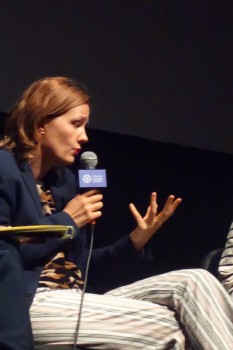
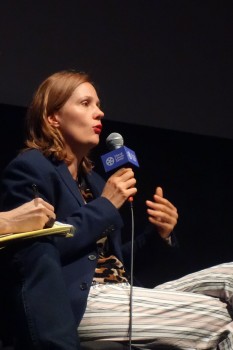
JUSTINE TRIET AT NYFF Q&A [CK photos]
Last edited by Chris Knipp; 01-09-2020 at 05:34 PM.
-
THE TRAITOR/IL TRADITORE (Marco Bellocchio 2019)
MARCO BELLOCCHIO: THE TRAITOR/IL TRADITORE (2019)
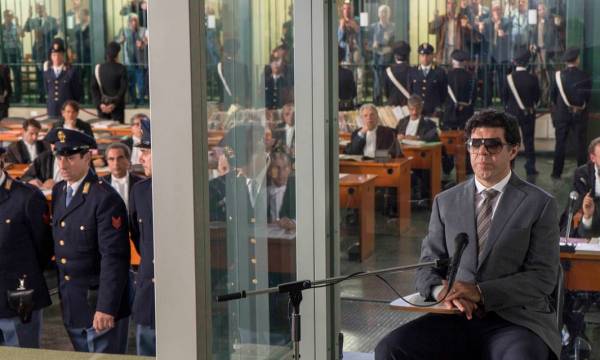
PIERFRANCESCO FAVINO AS TOMMASO BUSCETTA IN THE TRAITOR
For the Italians, a national epic; for us, a sprawling gangster movie with a weird trial sequence
Marco Belloccio's The Traitor seeks to depict the real life of Sicilian gangster Tommaso Buscetta, the so-called "boss of the two worlds." He is important because he was the first major mafia informant in Italy in the 1980's. The movie dramatizes with mind-blowing accuracy Bruscetta's trial as "il primo grade pentito di Mafia," the first high ranking Mafioso "penitent one" or state's witness, or traditore, ("traitor") in the eyes of the Cosa Nostra. This film is very highly regarded in Italy (see Paolo Casella in MyMovies or Federico Girone in ComingSoon, two big Italian movie sites) and was in Competition at Cannes. Anglophone critics have found it impressive in scope, but in some ways underwhelming. To us it seems somewhat bogged down from the start by an over-abundance of detail, such as a long initial sequence of horrific, loud, violent moments showing assassinations, accompanied by a roll call of flowery Italian names.
Because this is different, more "documentary," though not in the least lacking in the elements of gangster grand opera, The Traitor may seem, to Anglos, ultimately lacking in the flair of the director's other works, such as his muted, haunting 2003 Aldo Moro kidnapping drama Good Morning, Night or his energetic and beautiful fascist biopic Vincere (NYFF 2009). And this is not to mention possible overshadowing by the famous early career-making Belloccio films of the Sixties, Fists in the Pocket and China Is Near, the latter celebrated by Pauline Kael as "one of the most astonishing directorial debuts in the history of movies."
The Traitor covers twenty years, skipping most of Bruscetta's early career as a Mafia princeling. It falls into sections, dominated by its make-or-break testimony and trail segment. After the assassinations sequence shows off Cosa Nostra violence, we see Bruscetta move to Brazil, to get away from that and to run crime operations in Rio with his family and Brazilian wife. He leaves behind his two adult sons, one of whom is a heroin addict; it's a decision he regrets after they are both killed by his enemies. But in Brazil he is arrested and tortured. A flashy scene shows him in one helicopter and his wife dangling from another as the cops try to loosen him up by threatening to drop her.
He goes back to Italy and reluctantly, more to save his family than out of any "repentance" (and he rejects all titles for what he's doing), he begins testifying to Judge Giovanni Falcone (Fausto Russo Alesi). This happens in a series of private sessions and is the film's key relationship. Pierfrancesco Favino, the longtime character actor who plays Bruscetta with enigmatic grandeur, made a point in the NYFF Q&A of repeatedly insisting (in his excellent English) that Falcone is the hero of this story, not Bruscetta; that the men of the Cosa Nostra are evil, stupid fellows. Bruscetta himself hereafter cherishes his relationship with Falcone - whose courage in pursuing this case will lead later to his death in an explosion in a car (duly depicted). In time Bruscetta is given a roommate in his spacious prison accommodations, Totuccio Contorno (an excellent, low-keyed Luigi Lo Cascio), another high-ranking mafioso joining the ranks of pentiti.
Next, after Bruscetta is provided with his choice of tailored suits (with a chance meeting at the tailor's with the soon-to-be-tried "Il Divo" Giulio Andreotti), comes the trial. This is what makes The Traitor special. It seems to a non-Italian operatic, chaotic, absurd: but it not only follows transcripts and extensive films of the events, but was able to be shot in the actual huge courtroom where the trial took place. The "cross-examinations" where mafiosi abuse and accuse each other are wild, crazy macho stuff. Bruscetta, this first time (he will return from witness protection later for a repeat performance), is in a glass cage in the middle, while lesser prisoners are in metal cages along the side.
After this, which results in the sentencing of hundreds of mafiosi, Bruscetta joins his family in the US, in witness protection in various locations from Florida to New England to Colorado. This is interesting too, for its detail, the taste of danger he always felt, though, we learn, he died in his bed as he had wanted, at 71 - but this is also anti-climactic, the stuff of documentary, not of drama.
For Italians we have to remember the story of Tommaso Bruscetta is a great national epic, some kind of partial rite of purification from a long, dark past. For us the movie is more of a mixed bag, with too many digressions to make well-structured drama. The craft and the acting are impeccable, though, and often impressive.
Another important point noted by Bellocchio in his NYFF Q&A (speaking in crystal-clear Italian) but lost to anglophone-only viewers, is that much of the dialogue of the film is in Sicilian dialect that is subtitled in Italian when the film is shown in Italy. He can't understand Sicilian himself. Most Italians can't. This important alienation effect is lost for the US audience, since the Sicilian dialogue simply gets the same English subtitles as the Italian. Bruscetta tries to elevate himself by speaking a mixture of Sicilian and Italian (with some Portuguese, which he speaks always with his wife), but Contorno repeatedly points out that he cannot speak Italian. Awareness of this might help us understand a little better that Cosa Nostra is an alien empire, a strange and powerful cancer on the Italian state.
The Traitor/Il traditore, 145 mins., debuted in competition at Cannes with simultaneous Italian release; nine other festivals listed including Toronto and New York, screened at the latter for this review. Bought by Sony it's scheduled for US release Jan. 31, 2020. Current Metascore based on eight reviews: 57%. Highly regarded in Italy. Released in France Oct. 30, with an AlloCiné press rating of 4.3, equivalent to 86%.
Last edited by Chris Knipp; 01-21-2020 at 08:33 PM.
-
BEANPOLE (Kantemir Balagov 2019)
KANTEMIR BALAGOV: BEANPOLE/Дылда (2019
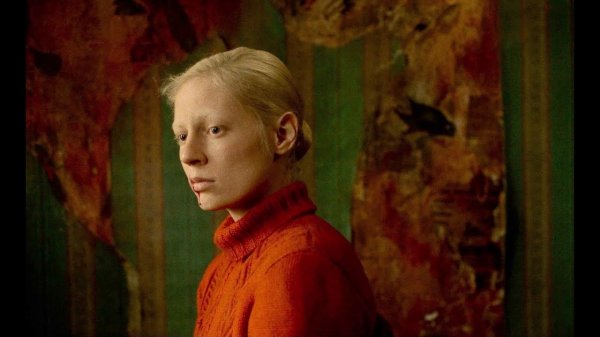
VIKTORIA MIRONSHNICHENKO IN BEANPOLE
Vibrant grimness
Kantemir Balagov is only 27 years old and this is his second feature; Jessica Kiang calls him in her Variety review a "blazing" talent. This is a long, agonizing study of two battle-scarred young woman working in a hospital in Leningrad, and those around them, just after the end of the War, showing how Russia and its people were ravaged then. The titular figure is Iya (Viktoria Mironshnichenko), whose height, pallor, and strange nervous and muscular condition got her that nickname.
The glowing look and the closeup intensity reminded me at first of Hungarian Laszlo Nemes' amazing debut feature Son of Saul (FCS/NYFF 2015). Balagov fools you, showing you a gallery of hopeless cases but then seeming to focus on cheer and life with Beanpolel's relationship to a cute little boy, then he delivers a rude shock. The plot is a tangled web of associations, manipulations, and disappointments. But if I understood Balagov correctly, the movie grows wholly out of his fascination with a book he discovered about PTSD among Russian woman after WWII, The Unwomanly Face of War by Svetlana Alexievich.
From early on, the action is almost too much to bear and too hard to watch. Yet all the characters, played by non-actors, are vivid, and the images glow with yellows and ochres. The cinematography by Ksenia Sereda is great. As ugly and depressing as the events are, they look beautiful, and the director's youthful enthusiasm makes this contradiction seem not cynical but right. This is a film about youth - youth sabotaged. The rickety, minimal trappings - long trolley cars, ornate but ancient automobiles - still seem very alive, if, like the people, likely to collapse and die at any moment. One old but elegant vehicle is driven by Sasha (Igor Shirokov), who comes one night looking for fun, and his hilariously clumsy frolic with Iya's friend Masha (Vasilisa Perelygina) leads to a tenacious connection. He is homely but he turns out to be rich. He can woo Masha with fruit, salt, and other goodies she shares with Beanpole.
I didn't altogether buy into the action, even though I remained open to being astonished. It's all too much, and the main characters are too fluid. When Shasha takes Masha to meet his mother in a grand house, it's a typically jaw-dropping sequence, an opening up of the action that typically soon closes down. Like everything, it all feels improvised, but in some ways all the more real for that. I salute this wunderkind's remarkable talent and invention.
Balagov hit the Russia film scene by surprise only two years ago with his debut feature, Closeness, which also unexpectedly made it into Un Certain Regard at Cannes, where it won the FIPRESCI Prize. At the time even Russians hadn’t heard of the young director, a disciple of the great Alexander Sokurov, whom he gave a nod to in his NYFF introduction of the film as "my teacher." A great deal may be understood by exploring this connection, but obviously Galagov has made what he learned from Sokurov his own as any master pupil does. It seems beyond the point to say this is one to watch. This is a brilliant, unforgettable film.
Beanpole/Дылда (Dylda), 130 mins., debuted in Un Certain Regard at Cannes May 2019, winning its Best Director award. Seven other festivals followed, including Toronto and New York, screened at the latter for this review. US theatrical release is planned for Jan. 29, 2020. Current Metascore 81%.
[Some of my information is drawn from this site: Russian Beyond.]
Last edited by Chris Knipp; 10-21-2019 at 01:37 AM.
 Posting Permissions
Posting Permissions
- You may not post new threads
- You may not post replies
- You may not post attachments
- You may not edit your posts
-
Forum Rules






 Reply With Quote
Reply With Quote









Bookmarks